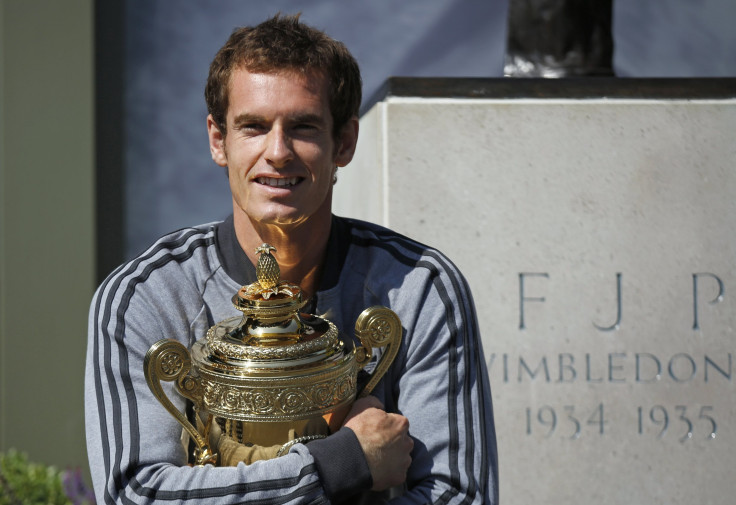Andy Murray: David Cameron Pushes For Knighthood On Wimbledon Champ

British Prime Minister David Cameron said he thinks that Andy Murray – the first Briton to win the Wimbledon’s men’s singles title in 77 years – deserves to be knighted for his achievement. Murray, a native of Dunblane, Scotland, defeated Serbian superstar Novak Djokovic, the No. 1-ranked tennis player in the world, 6-4 7-5 6-4, on Sunday.
Cameron, who watched the match, told reporters: "I can't think of anyone who deserves one [a knighthood] more. It was incredibly emotional because we've waited so long for a Wimbledon champion." Cameron added that Murray's win had "lifted the spirits of the whole country. It was a fantastic day for Andy Murray, for British tennis and for Britain.”
However, the self-effacing Murray, who is only 26 years old, responded: "It's a nice thing to have or be offered, but I don't know if [my victory] merits that. I think just because everyone's waited for such a long time for this [winning at Wimbledon], that's probably why it will be suggested." (The last British victor of Wimbledon’s men’s singles tournament, Fred Perry, won three straight titles from 1934 to 1936. Perry, who moved to the U.S. and became a naturalized American citizen in 1938, was never knighted. He died in 1995.)
As for Murray, he already has an OBE (Order of the British Empire), which he was awarded following his gold medal in the Olympics and his triumph in the U.S. Open last year. In the event Murray does indeed gain a knighthood, Cameron could not, on his own, bestow such an honor. Normally, candidates for knighthood are chosen by the public, followed by deliberations by a committee of the Foreign and Commonwealth Office – ultimately, the decision rests with both the prime minister and Queen Elizabeth II.
Moreover, it is not at all unusual for athletes to receive a knighthood – as BBC noted, in recent years, Sir Bradley Wiggins, the Olympic cyclist, and Sir Alex Ferguson, the legendary manager of Manchester United soccer club, have been so honored. Historically, knighthoods were typically granted to military figures, but in recent decades the pool of candidates has expanded to include scientists, business people, artists, actors and musicians. Non-Britons may also be knighted, although they are not called “Sir” (Chancellor Helmut Kohl of Germany, President Francois Mitterrand of France and Mayor Rudolph Giuliani of New York have received honorary knighthoods.)
In addition, not everyone even wants to be knighted or receive such similar honors -- between 1951 and 1999, 277 people refused the award, including author Roald Dahl, who turned down an OBE in 1986; author Graham Greene, who rejected a Commander of the British Empire (CBE) in 1956; and author Aldous Huxley, who turned down a full knighthood in 1959. Former Beatle John Lennon famously handed back his OBE in 1969, allegedly to protest Britain’s involvement in the Biafra civil war in Nigeria. His songwriting partner, Sir Paul McCartney, was knighted in 1997.
“Numerous successful sportsmen and women have been given these types of honors,” said Victoria Honeyman, a lecturer in British politics at the University of Leeds. “The knighthood itself doesn't practically mean a great deal and is more of a 'clap on the back' to those who have achieved great success.”
Honeyman added that there are rarely objections to sports people receiving the honor. “Although there is an argument that the title and honor have been devalued over the years and that there is really no need to give extra credit to successful sports people when successful individuals in other fields (teaching, engineering etc.) rarely receive them,” she noted.
© Copyright IBTimes 2024. All rights reserved.





















